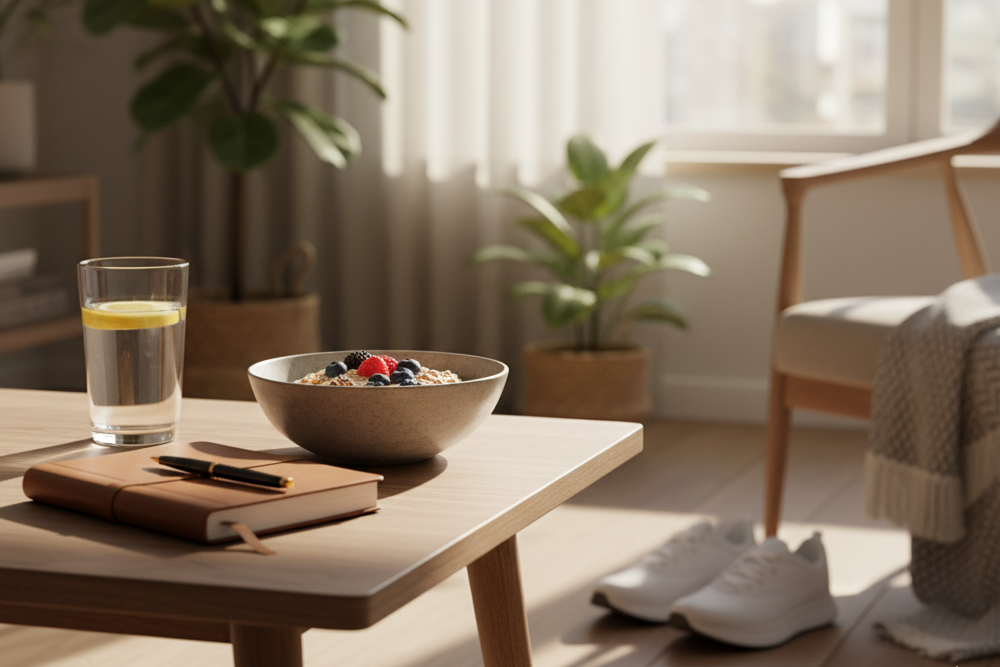How to Build a Healthier Routine in 2026: Simple Habits That Stick
Aiden Reese
2025-10-17
6 min read

The start of 2026 brings fresh opportunities to transform your daily routine into one that truly supports your wellbeing. While many people set ambitious health goals only to abandon them by February, the secret lies not in dramatic overhauls but in building simple, sustainable habits that naturally become part of your life. Creating a healthier routine doesn't require perfection—it requires consistency and a strategic approach that works with your lifestyle, not against it.
Start Small and Build Momentum
The most successful health transformations begin with tiny changes that feel almost effortless. Instead of committing to hour-long gym sessions when you haven't exercised in months, start with a five-minute walk after lunch. Rather than overhauling your entire diet, begin by adding one serving of vegetables to a meal you already enjoy. These micro-habits create positive momentum without triggering the resistance that often derails good intentions. Research consistently shows that small changes compound over time to create significant results. When you successfully complete a small habit, your brain releases dopamine, reinforcing the behavior and making you more likely to repeat it. This neurological reward system works in your favor when you start small, but works against you when initial goals feel overwhelming.
Design Your Environment for Success
Your surroundings play a crucial role in shaping your habits. Make healthy choices the easy choices by strategically organizing your environment. Keep a water bottle at your desk to increase hydration, place workout clothes beside your bed for morning exercise, or prep healthy snacks on Sunday to avoid vending machine temptations during busy weekdays.
Remove friction from positive behaviors while adding friction to negative ones. If you want to reduce screen time before bed, charge your phone in another room. If you want to eat more fruit, wash and prepare it immediately after grocery shopping so it's ready when you need a snack. These environmental tweaks work behind the scenes to support your healthier choices without requiring constant willpower.
Create a Balanced Morning Routine
How you start your day sets the tone for everything that follows. A well-designed morning routine doesn't need to be lengthy or complex, but it should include elements that energize your body and mind. Begin with hydration—your body has been without water for hours and needs replenishment to function optimally. Incorporate movement that feels good to you, whether that's gentle stretching, a few yoga poses, or dancing to your favorite song. Movement in the morning boosts circulation, improves mood, and creates energy that carries throughout the day. Follow this with a nutritious breakfast that includes protein to stabilize blood sugar and maintain steady energy levels until lunch. Consider adding a brief mindfulness practice, such as five minutes of deep breathing or writing in a gratitude journal. These practices help center your mind and build resilience for whatever challenges the day might bring.

Prioritize Quality Sleep
Sleep forms the foundation of every other healthy habit. When you're well-rested, you make better food choices, have more energy for exercise, and handle stress more effectively. Poor sleep disrupts hormones that regulate hunger and metabolism, making weight management significantly more difficult. Create a consistent sleep schedule by going to bed and waking up at the same times, even on weekends. Design a pre-sleep routine that signals to your body it's time to wind down. This might include dimming lights, avoiding screens for an hour before bed, or practicing relaxation techniques like gentle stretching or reading. Your bedroom environment matters too. Keep it cool, dark, and quiet. Consider blackout curtains or an eye mask if outside light is an issue. A comfortable mattress and pillows are investments in your overall health, not luxuries.
Build Sustainable Nutrition Habits
Healthy eating doesn't require complicated meal plans or eliminating entire food groups. Focus on adding nutritious foods rather than restricting everything you enjoy. Aim to include protein, fiber, and healthy fats in each meal to maintain stable energy and satisfaction. Meal preparation doesn't have to mean spending entire Sundays cooking. Simple strategies like washing produce when you bring it home, keeping healthy snacks visible and accessible, or preparing one component of meals in advance can make weeknight cooking much easier. Listen to your body's hunger and fullness cues rather than eating by external rules or timers. This intuitive approach helps you develop a healthier relationship with food that lasts long-term.
Integrate Movement Throughout Your Day
Exercise doesn't have to happen in a gym or require special equipment. Look for opportunities to add movement to activities you're already doing. Take phone calls while walking, park farther from store entrances, or use stairs instead of elevators when possible. Find forms of movement you genuinely enjoy. If running feels like punishment, try dancing, hiking, swimming, or playing recreational sports. When physical activity feels fun rather than obligatory, you're much more likely to stick with it long-term. Even on busy days, brief movement breaks can improve circulation, reduce muscle tension, and boost mental clarity. Set reminders to stand and stretch every hour if you work at a desk.
Manage Stress and Mental Health
Chronic stress undermines every aspect of health, from immune function to sleep quality. Develop a toolkit of stress management techniques you can use in different situations. Deep breathing works well for immediate stress relief, while regular exercise helps build long-term stress resilience. Social connections are vital for mental health. Schedule regular time with friends and family, even if it's just a brief phone call or text exchange. Strong relationships provide emotional support and help buffer the negative effects of stress. Don't hesitate to seek professional help if you're struggling with anxiety, depression, or other mental health challenges. Taking care of your mental health is just as important as addressing physical health concerns. Building a healthier routine in 2026 is about progress, not perfection. Focus on consistency over intensity, and remember that sustainable change happens gradually. By implementing these simple habits one at a time, you'll create a routine that not only improves your health but also feels natural and enjoyable to maintain.


